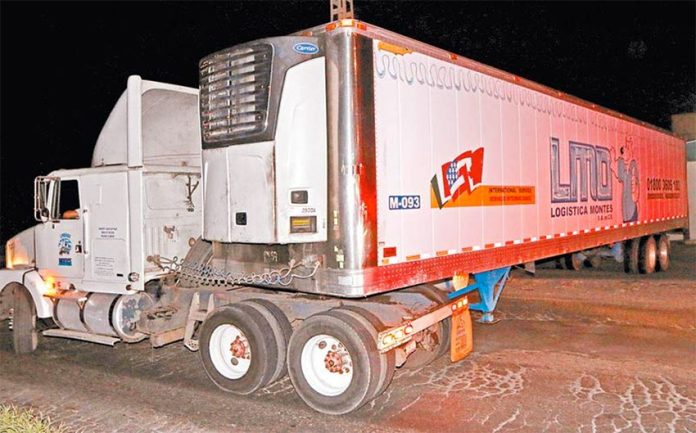When authorities in Jalisco left a refrigerated trailer full of corpses in two different neighborhoods of Guadalajara last month, residents were quick to complain about the fetid odors emanating from it.
Now it has been revealed that not only was the refrigeration system inadequate to store the bodies, the solution to overcrowded morgues was an expensive one.
The so-called “trailer of death” or “morgue-on-wheels” was storing 273 bodies, authorities later confirmed, although it was initially reported that there were 157 cadavers inside.
Although the trailer was refrigerated it was not designed to function as a morgue and had not been adapted for the purpose, the newspaper Milenio reported today.
The refrigeration capacity of the trailer was simply overwhelmed by the hundreds of bodies that were crammed inside. Hence the offensive stench.
Days after the gruesome contents of the trailer made headlines in Mexico and around the world, the former director of the Jalisco Institute of Forensic Sciences (IJCF) — who was dismissed for his role in the case — revealed that there were in fact two trailers of unclaimed bodies in Guadalajara.
However, Luis Octavio Cotero Bernal denied responsibility both for the decision to acquire the trailers and for the instruction for one of them to be shuffled around the Guadalajara metropolitan area, declaring that the Jalisco Attorney General’s office (FGE) had the “sole and exclusive power” in the matter.
It has now been revealed that since 2015, the FGE has rented at least four trailers to store bodies at a cost of approximately 20,000 pesos (US $1,050) per trailer per week or over one million pesos (US $53,000) per year.
That means the state government has paid up to four million pesos (US $210,000) annually for the makeshift morgues.
Milenio reported that the trailers were supplied by Logística Montes, a company that is listed on the state government’s transparency portal as a supplier to several government departments.
However, the payments the government made to the company owned by Rafael Montes have never been publicly declared, Milenio said.
That the trailers were incapable of preventing the rapid decomposition of the corpses appears to have been of little concern.
“They [the FGE] never cared about where they were storing bodies,” Cotero said, adding that on more than one occasion he called Jalisco Governor Aristóteles Sandoval to alert him to the situation and to seek assistance to resolve it.
“I told [Sandoval] that there were bodies in a bad state, that many of them had larva coming out of the [body] bags,” Cotero said.
The governor, however, attempted to deflect blame for the affair, stating that it was caused by “erratic action on the part of authorities” and pledging to “make up for this episode by providing an assurance that we will hire the best qualified staff . . . to avoid instances of negligence and indifference.”
For family members of people who have disappeared in Jalisco and continue to search for their missing loved ones, the governor’s “assurance” is cold comfort.
Since Leonel Arámbula disappeared in October last year, his cousin Belén Torres has accompanied the victim’s mother to morgues in Jalisco to check whether his body has appeared.
To date they have had no luck in locating Leonel and Torres fears that her cousin’s body could have been among the hundreds that were stored in one of the trailers hired by the FGE.
“Just imagining that my cousin is there is infuriating . . . He’s a human being and that is not just [treatment]. It makes me angry to think that he’s in a trailer being trampled on because they go in and walk among [the bodies],” she said.
Guadalajara is not the only city in Mexico that has resorted to using trailers to store bodies amid rising rates of violent crime that have inundated morgues with the corpses of victims.
Authorities in Guerrero have purchased 10 refrigerated containers to relieve pressure on morgues in Acapulco, Chilpancingo and Iguala while their counterparts in Veracruz and Tijuana, Baja California have acquired one trailer each.
Source: Milenio (sp)
